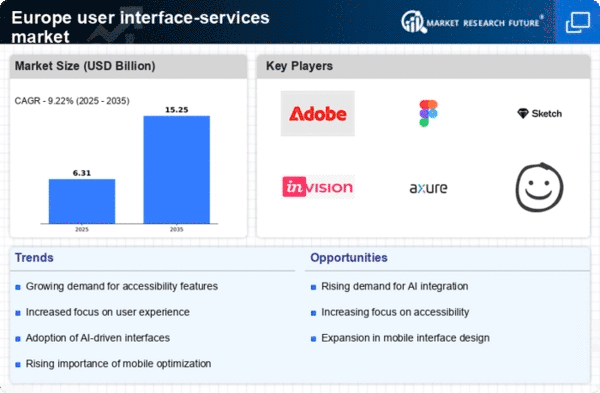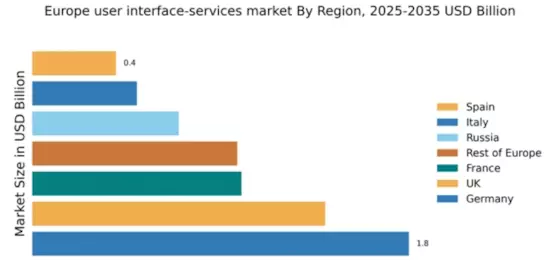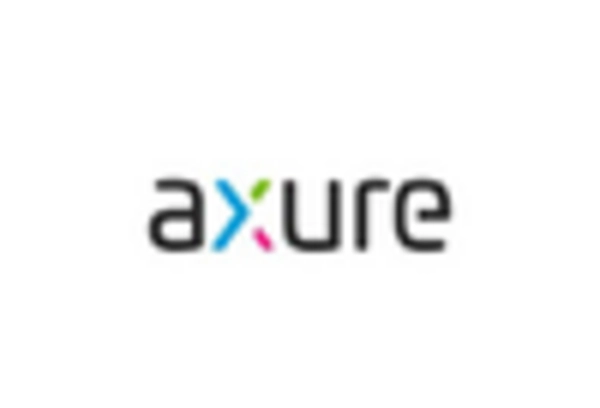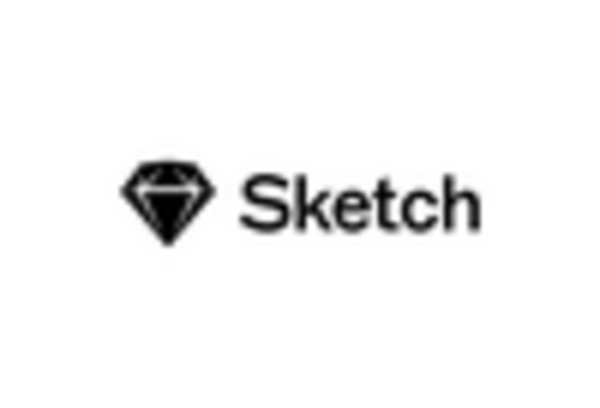Emergence of New Technologies
The user interface-services market in Europe is witnessing a transformative phase due to the emergence of new technologies. These include augmented reality (AR) and virtual reality (VR). These technologies offer innovative ways to engage users, creating immersive experiences that were previously unattainable. As businesses explore the potential of AR and VR, the demand for specialized user interface services tailored to these technologies is likely to increase. Market analysts suggest that the integration of AR and VR could lead to a 25% growth in user engagement metrics. This trend indicates a shift towards more interactive and engaging interfaces, driving the evolution of the user interface-services market.
Regulatory Compliance and Standards
The user interface-services market in Europe is influenced by stringent regulatory compliance and standards, particularly concerning data protection and accessibility. The General Data Protection Regulation (GDPR) and the Web Accessibility Directive impose specific requirements on businesses, compelling them to ensure that their interfaces are compliant. This regulatory landscape creates a demand for services that can help organizations navigate these complexities. Companies that prioritize compliance are likely to gain a competitive edge, as they can mitigate risks associated with non-compliance. The market for user interface-services is expected to grow as businesses seek expert guidance to align their designs with these regulations.
Increased Focus on Data-Driven Design
The user interface-services market in Europe is increasingly characterized by a focus on data-driven design methodologies. Organizations are leveraging analytics and user feedback to inform their design processes, leading to more effective and targeted user interfaces. This approach not only enhances user satisfaction but also improves conversion rates, with studies indicating that data-driven designs can boost conversions by up to 20%. As businesses recognize the value of data in shaping user experiences, the demand for services that facilitate data analysis and interpretation is likely to rise. This trend underscores the importance of integrating data insights into the design process within the user interface-services market.
Rise of Mobile and Multi-Device Usage
The proliferation of mobile devices and the increasing use of multiple platforms significantly impact the user interface-services market in Europe. With over 70% of internet users accessing services via mobile devices, businesses are compelled to adapt their interfaces accordingly. This shift necessitates the development of responsive designs that function seamlessly across various devices. As a result, companies are investing heavily in mobile-first strategies, which are projected to account for a substantial portion of the user interface-services market revenue. This trend not only enhances user engagement but also drives the need for specialized services that cater to diverse device requirements.
Growing Demand for User-Centric Solutions
The The user interface-services market in Europe is experiencing a notable surge in demand for user-centric solutions. As businesses increasingly recognize the importance of enhancing user experience, the focus shifts towards creating interfaces that prioritize usability and engagement. This trend is reflected in the market data, which indicates that user-centric design can lead to a 30% increase in customer satisfaction. Companies are investing in research and development to understand user behavior better, thereby tailoring their services to meet specific needs. This growing emphasis on user-centric solutions is likely to drive innovation within the user interface-services market, as organizations strive to differentiate themselves in a competitive landscape.

















